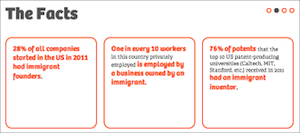On Dec. 16, Congresional leaders released a $1.1 trillion spending bill that will increase the H-1B filing fee for any consulting firm looking to hire a nonimmigrant worker.
A fee of $4,000 will be applied to firms of at least 50 employees that have at least 50% of their employees on an H-1B or L-1 visa for any H-1B that isn’t an amendment. This will effectively double the previous legal fee of $2,000 which was established in 2010. The L-1 fee for companies with 50% of their workers on a visa is $4,500, according to the bill.
The increased fee will be used to help create “a biometric entry and exit tracking system,” the legislation said. The final vote is expected to happen Dec. 18. This will be a great stress to applicants and petitioners alike. This may also be in response to the high demand for H-1B visas, as well the uptick in the conversation among legislatures looking for immigration reform.
On top of this action, there is also a lack of action on the front of the I-squared Act. Introduced in the Senate in January, the Immigration Innovation Act of 2015, or the I-Squared Act, could really improve the visa application process for H-1B applicants in a variety of ways. The biggest of which is the potential for a much higher H-1B cap.
However, the latest attempt of amending the Immigration and Nationality Act by Congress has yet to be voted on by the Senate. Even though tech giants around the United States, including Google, Microsoft and Facebook, have lobbied for the Senate to vote for the bill, it appears that the bill has a very low chance of passing.
Should the Act pass, the H-1B cap could be raised from 65,000 visas to as much as 195,000, effectively tripling the cap. The Act would also create additional grace periods to ease maintenance of status and create a blanket cap exemption for those applying under the H-1B advanced degree cap.
Additionally, the passing of the Act would make life much easier for F-1 students. International students on an F-1 visa would be able to use “dual intent,” or the desire to remain and work in the United States following graduation from an accredited U.S. institution. This helps those who were educated here in the U.S. to stay in the U.S once they are finished with their work.
The bill also has sections dedicated to STEM education funding and training. Sections 401-406 have to do with the STEM education grant application process for foreign nationals looking to attend colleges and universities in America. These amendments would enhance the economic competitiveness of the United States by strengthening STEM education, especially in IT fields, ensuring that schools have access to well-trained and effective STEM teachers, supporting efforts to strengthen the elementary and secondary curriculum and helping colleges and universities produce more graduates in fields needs by American employers.
Also, the Act would make it harder for the Department of Homeland Security to deny a subsequent petition or application for a previously approved visa petition or admission application to extend the status of an H-1B or L-visa (intra-company transferee) nonimmigrant involving the same alien and petitioner. The only way the Secretary of DHS or Secretary of State could deny one of those is if there was a material error in the previous petition approval, a substantial change in circumstances took place that renders the nonimmigrant ineligible for such status or new information was discovered adversely impacts the eligibility of the employer or the nonimmigrant.
 Those who come to America on an H-1B employment-based visa help improve the economy in a number of ways, including creating jobs and technological growth. The passing of the Act would make the United States more attractive to skilled workers who would surely improve small and big businesses through the country.
Those who come to America on an H-1B employment-based visa help improve the economy in a number of ways, including creating jobs and technological growth. The passing of the Act would make the United States more attractive to skilled workers who would surely improve small and big businesses through the country.
If you have questions about immigration and/or you need help in an immigration process, please contact The Law Firm of Shihab & Associates, Co., LPA for a consultation. Our law firm handles various matters including Green Cards and Permanent Residence, family immigration, asylum cases, immigrant visas, non-immigrant visas, employment visas and H-1B visas, investors-visa, PERM applications and many more.
1) Innovation Immigration and The I-Squared Act of 2015, http://www.msba.org/Bar_Bulletin/2015/08_-_August/Innovation_Immigration_and_The_I-Squared_Act_of_2015.aspx
2) S.153 – I-Squared Act of 2015 https://www.congress.gov/bill/114th-congress/senate-bill/153
3) Text of the I-Squared Act of 2015, https://www.govtrack.us/congress/bills/114/s153/text
4) Congress doubles H-1B fee to $4,000, http://www.computerworld.com/article/3015998/it-careers/congress-doubles-h-1b-fee-to-4-000.html , Thibodeau, Patrick, Dec. 16, 2015

